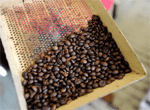
One of the most expensive and rare coffees in the world, Kopi Luwak or Civet Coffee is made from the droppings of Asian Palm Civits. Palm Civits feed on berries and pulpy fruit like figs and palm. They are also known to feed on small vertebrates, insects and seeds.
When Coffee seeds are eaten for their pulp by a certain type of civit, the beans are defecated in clumps after undergoing about 18 hours of the Civit’s digestion process - yet they continue to maintain their shape and even some of the berries fleshy inner layers.
Historical Origins of Kopi Luwak
- In the mid-19th century, the Dutch established Coffee plantations in parts of their colonial empire Java and Sumatra Islands of the Dutch East Indies.
- Native plantation workers were not allowed to pick the coffee fruits for their own use.
- Curious to taste the now famous beverage, they soon observed that a species of Luwark ate the coffee fruits and left the undigested seeds as droppings. They collected these seeds, cleaned, and roasted them. After grinding they used the powder to make their own coffee.
The Dutch plantation owners on learning of the natives brew were soon enamoured by the aroma. Because of Luwak’s rarity and the abnormal process and collection difficulties, Luwak became an expensive brew even in those colonial times.
Health benefits
The civit’s digestive enzymes penetrate the beans, altering their chemical balance. The result is coffee with no bitterness and a uniquely smooth flavour.
Current opinion has it that Civit Coffee can prevent:
- Asthma
- Parkinson’s
- Diabetes
- Colon Cancer.
Although these claims remain unconfirmed by scientific evidence, the believers continue to grow in number.
Rare and Expensive
To counter the difficulty in obtaining the best wild civit droppings, large farms have been set-up. Civits being hunted for their meat is another concern as dwindling numbers adds to the difficulties of high collections of droppings required to meet demand.
In the UK at up-market establishments the price is as much as USD 100 equivalent to 60 Pound Sterling per cup of this coffee.
Fake brands in abundance
Scarcity has enabled other the Vietnamese to produce the same Luwak taste by chemically treating regular beans.
Copycats have followed suit, and it is now believed that a good 50% of Civit Coffee is fake. This fake sells at half the cost and has not taken long to find its way into the International market too.
Ironically, rarity and high prices have only added to Civit Cat Coffee’s growing popularity and success as it continues to be seen as a luxury commodity that is hard to get hold of.
Richard Woods is a writer for KLIX UK, a vending division of Mars Inc.
